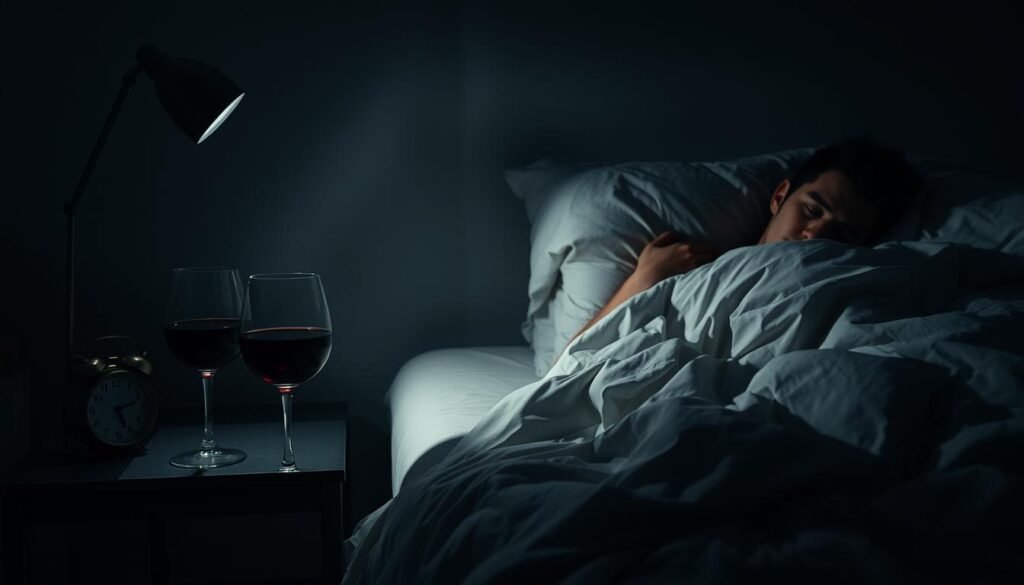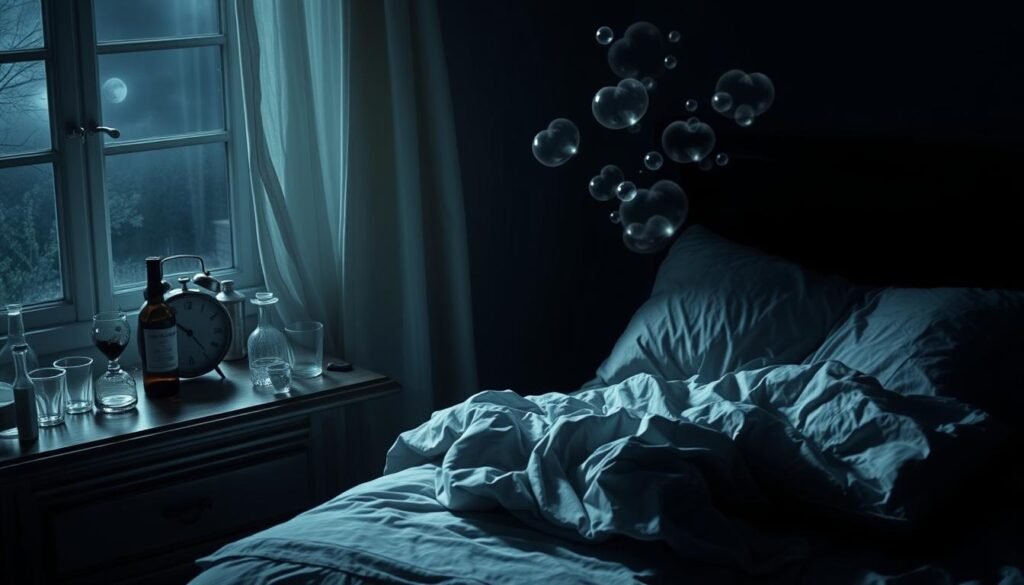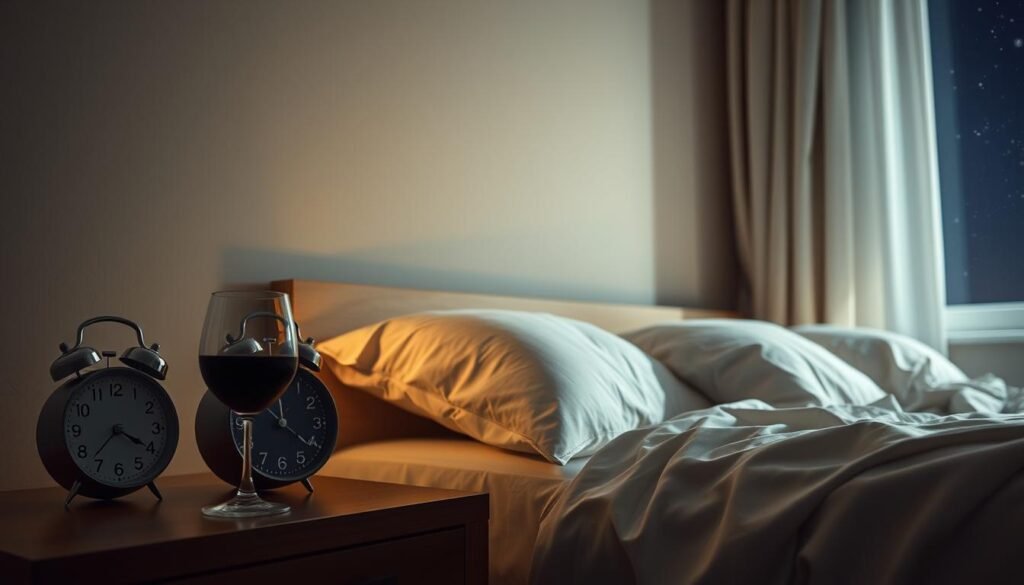Did you know that 36% to 91% of people with alcohol problems have insomnia? This fact shows the strong link between alcohol and sleep. Many think drinking helps them sleep faster. But, in truth, alcohol might seem to help at first but hurts sleep quality in the long run. It can even lead to serious sleep issues.
This article looks into how drinking and insomnia are connected. Even a little alcohol can mess with your sleep. We’ll dig into the science to show how alcohol changes your sleep cycle. This can help people know more about their sleep problems and the risks of drinking too much. For more, read this helpful piece on how drinking can cause insomnia.
Key Takeaways
- Between 36% and 91% of those with alcohol dependence face insomnia.
- Even casual drinkers have a 25% higher risk of developing obstructive sleep apnea (OSA).
- Alcohol messes up the sleep cycle and reduces restorative sleep.
- Quitting alcohol may make many sleep better.
- Even if alcohol helps you sleep now, it may cause problems later.
- Fixing sleep problems is very important for those getting over alcohol addiction.
Understanding the Relationship Between Alcohol and Sleep
The relationship between alcohol and sleep is complex. Drinking lightly can make you relaxed and fall asleep faster at first. However, over time, it often leads to problems in your sleep cycle. Nearly 90% of people who drink in the evening face sleep issues. For those with alcohol use disorder, around three-quarters struggle with insomnia after drinking.
Drinking alcohol can mess with how your body signals night and day. This affects melatonin, which helps you sleep. This leads to sleep problems and may cause some to drink more, thinking it will help. But, this actually makes sleep quality worse.
Research links heavy drinking with a higher chance of sleep troubles, including insomnia. Rates of insomnia in those with alcohol-related issues vary from 36% to 91%. Drinking too much also raises the risk of sleep apnea. Using alcohol to fight insomnia can make sleep problems even more severe.
Experts say to avoid alcohol for at least three hours before bed. This can help you sleep better. It also helps in managing drinking habits. Avoiding alcohol before sleep can make a big difference in getting a good night’s rest.
How Does Alcohol Affect the Sleep Cycle?
Alcohol changes how we sleep, often making us think we’re sleeping well. Many people feel alcohol helps them fall asleep quicker. This might seem like a quick way to better sleep.
But alcohol really changes the sleep stages of our body. It can increase deep sleep for a short time. However, it reduces the vital rapid eye movement (REM) sleep.
This REM sleep is crucial for our emotions, memories, and thinking. Even if you fall asleep easily, you may wake up feeling not well-rested.
Once alcohol breaks down in the body, sleep becomes lighter and more interrupted. Many people then wake up often during the night. This can make sleeping problems like insomnia and sleep apnea worse.
In fact, drinking a lot can make you 25% more likely to get sleep apnea. This disturbs deep, healing sleep.
Also, alcohol makes you go to the bathroom more at night. This breaks the sleep cycle. Studies show up to 91% of those with alcohol issues might also have insomnia.
It’s wise for those with sleep problems to look at their alcohol use. The CDC advises not more than two drinks for men and one for women daily. This can help sleep better.
To learn more about how drinking affects sleep, check out this insightful resource.
Drinking Causes Insomnia: The Science Behind Sleep Disruption
When we drink alcohol, it can affect our sleep more than we think. Many people don’t realize how their drink choices impact their rest. Although alcohol might help you fall asleep faster, it messes with your sleep quality.
Impact on Rapid Eye Movement (REM) Sleep
Studies show alcohol reduces REM sleep, which is crucial for thinking and emotions. People who drink a lot can have delayed REM sleep. This effect is strongest in the first part of the night.
Drinking too much, over time, can make it hard to enter REM sleep quickly. This means you won’t feel as rested.
Effects on Sleep Architecture
Alcohol changes the structure of your sleep, causing restless nights. In the first few hours, you might sleep deeply due to its effects on GABA, a brain chemical. But as the night goes on, and the alcohol wears off, you might find yourself waking up often.
This lack of deep sleep can make you feel more tired. It can worsen sleep problems, making it harder to get a good night’s rest.

Common Problems Associated with Drinking Before Bed
Drinking before bed can mess with your sleep quality. It often leads to insomnia for many. Even though some people drink to relax, it may end up causing more sleeplessness.
Frequent Wakings During the Night
Alcohol makes people wake up a lot at night. It messes up the sleep cycle, especially REM sleep. Although many older adults drink, those with insomnia often use it as a sleep aid. But 67% say it only helps them sleep for a little while.
Increased Risk of Sleep Apnea
Alcohol can increase the risk of sleep apnea. It relaxes the throat muscles and might block your airway during sleep. Those who drink are 25% more likely to get sleep apnea. This condition makes sleep worse and can lead to serious health problems.

Studies are looking into how drinking affects sleep hormones like melatonin. This is important because drinking a lot can cause ongoing sleep problems.
| Effect of Alcohol on Sleep | Impact |
|---|---|
| Frequent Awakenings | Increases wakefulness and disrupts sleep cycles. |
| Reduced REM Sleep | Shortens duration and alters REM sleep patterns. |
| Increased Sleep Apnea Risk | Relaxation of throat muscles leads to potential airway obstruction. |
| Diuretic Effect | Causes nighttime awakenings due to increased urination. |
It’s key to understand the ways alcohol affects sleep over time. Regular drinking can harm your sleep health, adding to insomnia and other sleep issues.
For more details, check out the link on how alcohol disrupts sleep.
How Many Hours Before Bed Should You Stop Drinking?
Experts say to stop drinking at least four hours before bed to improve sleep. This time lets your body process the alcohol, reducing its impact on alcohol and sleep. Most people don’t realize it takes about an hour to metabolize one drink. So, to have a good night’s sleep, it’s best to finish any drinks well before bedtime.
Binge drinking affects your melatonin and messes with your sleep for up to a week. This can mess up how well you sleep, like making your REM sleep worse. Even though alcohol might make you sleepy at first, it often results in a bad night’s sleep later on.
To keep your sleep quality high, avoid alcohol four hours before bed. This can help you avoid waking up a lot, getting headaches, and having bad dreams. People who drink close to bedtime, especially if they have alcohol problems, might face worse sleep issues. They might try to use alcohol to sleep, but it only makes things worse.

Drinking in moderation is key for good sleep. Experts advise up to two drinks for men and one for women per night. Sticking to these limits can prevent sleep problems caused by alcohol. This leads to better sleep overall.
The Role of Alcohol as a Sleep Aid
Many people use alcohol to help them sleep. Initially, it seems like a quick way to fall asleep. About 30% of those with insomnia try this method. But, using alcohol for sleep can lead to bigger sleep problems later on.
Short-Term Benefits vs. Long-Term Consequences
At first, alcohol might make falling asleep easier. Drinking a little bit before bed can help those with trouble sleeping. But this can soon lead to issues. People who drink to sleep may start drinking every day. The risk of turning into a daily drinker is 8.43 times higher. This can also cause problems with staying asleep through the night.
There’s a big worry about how alcohol affects sleep in the long run. For those with insomnia and alcohol issues, up to 55% use alcohol to sleep. This habit can make sleep quality worse over time. Long-term, it raises the chances of having chronic insomnia. There’s also a connection between PTSD and using alcohol to sleep, with a risk factor of 2.11.
For those struggling with sleep and alcohol, there is help. Cognitive Behavioral Therapy for Insomnia (CBTi) is one path to better sleep. It aims to improve sleep quality. This can boost your overall health, mind function, and lower risky behaviors linked to poor sleep.
| Aspect | Short-Term Impact | Long-Term Consequences |
|---|---|---|
| Alcohol as Sleep Aid | Promotes initial relaxation | Leads to dependency and reduced sleep efficiency |
| Daily Drinking Odds | 8.43 times more likely for users | Increased risk of alcohol-related problems |
| Insomnia Rates | 30% use alcohol to cope | Rates up to 58% among those with AUD |
| CBTi Effectiveness | Helps with short-term management | Recommended for chronic insomnia treatment |
How to Improve Sleep Quality After Drinking
Improving sleep after drinking alcohol means following certain steps. These steps help your body bounce back and feel better overall. Good sleep habits are key to fighting off the bad effects of alcohol on sleep.
Tips for Better Sleep Hygiene
For better sleep after drinking, try these ideas:
- Maintain a dark and cool sleeping environment: Darken your room with blackout curtains and keep it at a comfy temperature for improved sleep.
- Establish a consistent sleep schedule: Going to bed and waking up at the same time every day helps your body’s sleep routine.
- Limit screen time: Cut out screens at least an hour before bed to lessen blue light, which makes sleeping hard.
- Stay hydrated: Drink plenty of water with your drinks to fight off dehydration, which happens because alcohol makes you lose more fluids.
Hydration and Nutrition Considerations
Eating right and staying hydrated is crucial after drinking:
- Balance meals before drinking: A healthy meal before drinks can slow down alcohol effects, making them less intense.
- Consider simple sugars: Foods like honey help keep your blood sugar stable, which dips after drinking.
- Hydrate continuously: Mixing in water with your drinks cuts down how much alcohol you have and keeps you hydrated.
- Supplement with magnesium: Taking Magnesium Glycinate can help you relax and sleep better, aiding in recovery from drinking.
Changing Your Relationship with Alcohol
Starting to change how you deal with alcohol begins by seeing its effects on sleep and health. About 70% of adults in the U.S. drink alcohol. Half of these drinkers might face alcohol dependence issues at some point. For those finding it hard to sleep, it’s crucial to rethink their alcohol use.
The link between drinking alcohol and sleeping poorly is strong. Up to 10 million individuals seek medical advice for sleep troubles linked to alcohol. Chronic insomnia affects 30% to 35% of adults, often due to alcohol.
It’s important for someone wanting to shift their drinking habits to find support. The National Institute on Alcohol Abuse and Alcoholism (NIAAA) has support groups. Talking to a therapist or doctor can also help understand the effects of alcohol on our health.
Many use alcohol to try to fix insomnia, which in turn makes sleep worse. Drinking in the late afternoon can worsen sleep problems due to its stimulant effects. Noticing this pattern is a step towards getting the right help and support resources.
Programs like Summit Detox offer science-backed detox methods for alcohol and other addictions. Choosing healthier options and fixing sleep issues helps break free from alcohol’s bad effects on sleep. With the right support and expert advice, changing your relationship with alcohol is possible.
Conclusion
Many studies show that drinking can seriously mess up your sleep. People often think alcohol helps them sleep, but it actually leads to bigger sleep problems. Research points out that drinking regularly can make your sleep quality drop and mess with your REM sleep.
This habit can make insomnia symptoms get worse. It leads to waking up often and having trouble falling back asleep. This issue can make you feel more than just tired. It can hurt your thinking skills, heart health, and overall happiness. Cutting back on alcohol is key to sleeping better.
Improving your sleep means being smarter about how you drink. If you practice good sleep habits and drink less, your sleep and health will get better. For more info, check out the research link here.